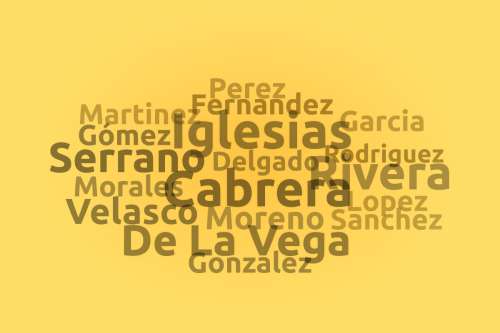The Spanish language and naming systems date back to Ancient Rome. Up until the 5th century, Spain was part of the Roman Empire. In the 6th century, a group of early Germanic people known as the Visigoths went to war with Rome, eventually conquering Spain and much of the Iberian Peninsula. Due to living under the Visigoth rule for much of the Middle Ages, today some of the most common Spanish last names are influenced by German first names and German name origins. For example, the surname "Valdez" is derived from the Old German word for bald.
Today, many Spanish surnames incorporate multicultural elements. In Hispanic-speaking countries like Argentina and Mexico that use double-barreled last names combine elements of Spanish last names with other cultures such as Italian or French surnames. Similarly, in places like Puerto Rico, many people have surnames of non-Spanish origins. For example, one of the most common Puerto Rican last names, Damiani, comes from Italian and Greek origins.
Spanish Naming Customs
Like many cultures, last names of Spanish origin are derived from family names (patronymic/matronymic), place names, descriptive names, or names of occupations. Spanish names, however, don't always follow a linear path. A person, for example, may have two last names, one from their mother and one from their father. A Hispanic or Spanish-speaking person will typically have their mother's surname first, followed by their father's surname.
Let's look at an example of a patronymic name. If Diego Lopez Reyes marries María Hernandez Diaz, both will keep their last names. Then if they have a baby boy named Leonardo, his full name will be Leonardo Hernandez Lopez.
The use of two surnames was originally introduced in the Middle Ages by Madrid's Castillian kings. For thousands of years, those with two surnames were only royalty and the upper class. However, this naming practice started to become universally common in the 19th century.
Many Spanish surnames indicate familial ties and descendants by ending in the suffixes "-az, -ez, -iz, or -oz." Each of these means "son of." Therefore someone named Hernando Suarez is the son of Suero.
Unique Spanish Names with English Meanings
Spanish last names, or surnames, often carry rich historical and cultural significance. Some of the most beautiful Spanish surnames are descriptive names inspired by the names of places, animals, or physical traits. Here are a few of the most interesting Spanish surnames.
- Cabrera - A place name meaning "place of goats."
- De La Vega - A topographic name meaning "fertile" or "water meadow."
- Delgado - A descriptive surname derived from the Latin word for "dainty. Delgado also translates to thin/slender in Spanish or Portuguese.
- Iglesias - Plural of the Spanish word for church.
- Morales - A topographic name that translates to "mulberry tree" in English.
- Rivera - The Spanish word for "riverbank".
- Serrano - A topographic name for someone who lived by the mountains. This name is commonly used in both Portugal and Brazil.
- Velasco - a name from Basque origins that translates to "raven" or "little crow."
Most Common Spanish Last Names and Meanings
Presently, the most common Spanish surnames are some of the most-used names in the world. Spanish names can be found throughout Europe, Latin America, and the United States. Here are 10 of the most common Spanish last names today.
- Fernandez - Son of Fernando.
- Garcia - Son of Garcia.
- Gómez - Son of Gome.
- Gonzalez - Son of Gonzalo.
- Lopez - Son of Lope.
- Martinez - Son of Martin.
- Moreno - A descriptive name for someone with dark hair or a darker complexion.
- Perez - Son of Pedro, the Portuguese and Spanish equivalent of the name Peter.
- Rodriguez - Son of Rodrigo or son of Roderick.
- Sanchez - Son of Sancho. The Spanish personal name Sancho translates to "sanctified."
What Are the Most Popular Spanish Surnames?
Use the list below to find your last name and learn about its meaning and origins. (It may also be helpful to check out the Ultimate Guide to Mexican Names!)
- Aguilar - This Spanish surname originates from the Latin term "Aquilare" meaning "haunt of eagles." It's often associated with people who live near an important habitat for eagles.
- Alvarez - A patronymic surname meaning "son of Alvaro." Alvaro is derived from the Germanic name "Allvar," meaning "all guard" or "defender of all."
- Hernández - This is another patronymic surname, meaning "son of Hernán." Hernán is a Spanish given name derived from the Germanic name "Ferdinand," signifying "brave journey."
- Juarez - This surname belongs to the patronymic category as well, meaning "son of Juaro." Juaro is a variant of the personal name "Suero," which in turn is of debated origin.
- Ortiz - Meaning "son of Orti," it's a patronymic surname. Orti is a variant of Fortunio, which is derived from the Latin "Fortunius," meaning "fortunate."
- Ramirez - This surname means "son of Ramiro," another patronymic surname. Ramiro is a Spanish given name originating from the Germanic name "Raginmar," meaning "advice" and "fame."
- Rubio - This Spanish surname refers to a person with blond or fair hair, from the Latin "rubeus," which means "red."

